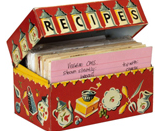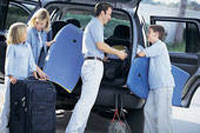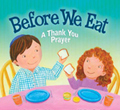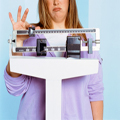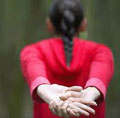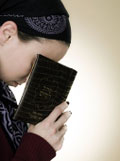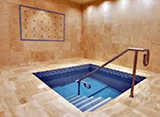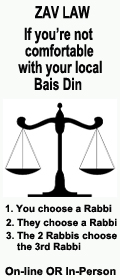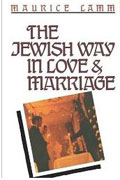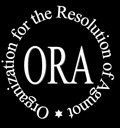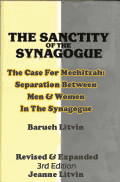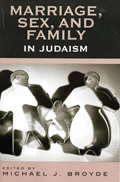Q & A HALACHA
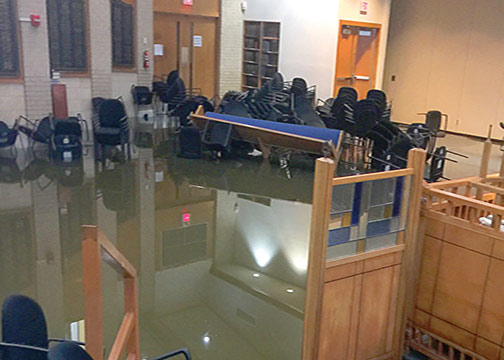
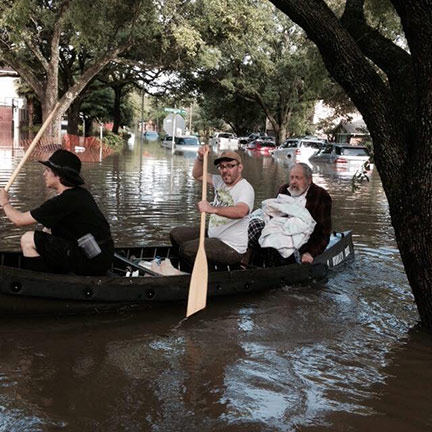
There is a major storm expected to arrive on Shabbas.
What are some possible halachic ramifications?
- The first issue we will discuss is carrying on Shabbas:
1. Many Jews live in communities that have an eruv.
2. The eruv is typically checked every week & once the eruv has been checked & found
to be in order; there is a presumption (chazaka) that the status will not change on Shabbas
3. It is on this basis that we are permitted to carry on Shabbas. - However, when there is or was a storm & large branches were knocked down & especially
if we know that there have been power outages, this creates a weakness (reiyusa) with the chazaka.
1. Once there is a weakness (reiyusa), one should no longer rely on the chazaka until the
eruv has once again been checked & found to be intact.
2. If a city eruv is broken, the Mishnah Berurah (276:25) writes that one is permitted to ask
a non-Jew to fix it, since many Jews might not realize that the eruvis down and may carry
outside on Shabbas.
♦♦♦♦♦
There is a major storm expected to arrive on Shabbas.
What special preparations should I make regarding
lighting candles (Hadlokas Neiros)?
- Concerning lighting candles, there is a mitzvah to have light in every room that one will use
on Shabbas (Mishna Berura 263:2 and Shemiras Shabbos K’Hilchaso Vol. 2:43:15)
- We usually fulfill this obligation by leaving on electric lights all over the house.
1. Most people do not light candles in their bedrooms; instead they leave on an electric
light in the hallway.
2. This way they will not stumble when entering their bedrooms. - However, if one is anticipating a major storm & is concerned that the electricity might be knocked out, it is proper to set up candles or flashlights in strategic areas of the house so
that one will not stumble when they enter the kitchen, bedrooms or other living areas.
♦♦♦♦♦
Our electricity was restored on Shabbas
& the lights in the house went back on.
Can we benefit from these lights
even though they were restored on Shabbas?
- One is not permitted to benefit on Shabbas from work (melacha) that was done by a non-Jew
for the sake of a Jew.
- This is true even if the Jew did not request the favor.
- The Mishna Berura 276:2 explains that this is forbidden because we are concerned that in
a future situation, one might ask the non-Jew directly. - However, if the majority of those who will benefit from the work (melacha) are non-Jews, then
a Jew may benefit as well. - In most situations, the majority of people who will benefit from the restoration of power
are non-Jews. - However, even if a neighborhood is mostly Jewish, it is still permitted to benefit from the lights.
- The electric company restores power for their own benefit (they are legally required to do so), regardless of whether anyone asks.
- Since the workers are doing so for their own needs a Jew may benefit from the electricity as well. (See Mishna Berura 276:17.)
♦♦♦♦♦
If the electricity went off on Shabbas & was subsequently restored
a few hours later by non-Jewish workers,
what is the status of the re-heated food, such as cholent.
- Shmiras Shabbos K’Hilchaso (32:{174}) & Teshuvos B’tzeil Hachochma (4:137)
write that if there is a power outage on Shabbas, it is permissible to enjoy the hot food even if the food cooled down & was then reheated when the power was restored. - There is no problem of benefiting from the action of a non-Jew on Shabbas because, as was explained in an earlier Halacha Yomis, the non-Jewish workers restore the power for their own benefit & therefore a Jew may benefit from the electricity as well.
- There is also no violation of the restriction of the prohibition of reheating food on Shabbas (chazara) , since in this case, the Jew is passive & it is treated as if everything happened on its own.
- On the other hand, the Chazon Ish disagrees & holds that chazara is violated even without any action.
- As soon as one notices that the power has returned, according to Chazon Ish, one is required to remove the crockpot.
- Rav Schachter,Shlita
1. Felt it best to be stringent & follow the position of the Chazon Ish.
2. However, if the cholent is the main course of the meal & one will not have enough to eat
without it, Rav Schachter ruled that one may rely on the lenient opinion & leave the cholent
in the crockpot & eat it during the meal.
♦♦♦♦♦
The electricity went off briefly on Shabbas
& now I have an alarm that is beeping louldy.
It is very disruptive. Can I ask a non-Jew to turn off the alarm.
- Ordinarily, one isn't permitted to ask a non-Jew to do any work (melacha) on Shabbas
that one isn't permitted to perform himself. - Therefore, if one can close the door of the room or block out the noise with blankets, then
this is the preferred method. - However if this isn't effective & the alert is causing one distress, they may as a non-Jew to unplug it.
- This is because turning off an alarm is at most a rabbinic prohibition.
- One is permitted to ask a non-Jew to violate a rabbinic prohibition (Shvus d'Shvus)
in cases of great personal discomfort (See Magen Avrohom 276:15)
♦♦♦♦♦
Our electricity went off on Shabbas & I have a freezer full of meat.
The Eruv is still intact. My neighbor still has electricity.
May I transport on Shabbas the contents of my freezer to my neighbor?
- Shulchan Aruch (OC 308:31) writes that raw meat is not muktzah, because there are
people who will eat raw meat. - However the Aruch Hashulchan (308:58) writes that today raw meat is muktzah, since
it's not common to find such people. - Although not everyone agrees with this stringency of the Aruch Hashulchan,
1. The Shevet HaLevi 3:29 writes that if the raw meat is frozen then all would agree
that it is muktzah
2. Since in it's current state, it is not is not usable in any way & can't even be fed to an
animal. - The halacha is that one may not move muktzah on Shabbas even if it will get ruined.
- However, one may bring trays of ice from their neighbor to put in their freezer so that it will remain old.
- If this isn't possible & the meat will get ruined over Shabbas, thereby causing a financial loss, there is a basis in Halacha (Jewish Law) to allow asking a non-Jew to transport the meat to
a working freezer. - The Mishnah Berurah (307.22)
1. Cites the opinion of the Magen Avrohom that in cases of great loss, one may ask a non-
Jew to violate the laws of muktzah.
2. However, it is best to avoid asking a non-Jew directly if there is a way that this can be accomplished through hinting, since the Mishnah Berurah notes that not all poskim agree
with this ruling.
♦♦♦♦♦
If people could not come to shul because of the storm & the
Parshas Hashavua (Torah portion) was not read on Shabbas
morning, when should this Torah portion be read?
- Shulchan Aruch (OC 135:2) writes that if the Torah was not read on Shabbas morning,
that week’s Torah reading & the next week’s Torah portion should be read on the upcoming Shabbas. - See Mishnah Berurah (135:4-8) for directions on exactly how a double reading should be conducted, as well as a list of exceptions as to when a parsha cannot be made up.
- Although we do not make up a missing parsha during the week, the Dogul Mervava,
quoted by the Mishnah Berura (135:5), writes that if the Torah can be read at Mincha
of the first Shabbas, we call up seven people for aliyos & read the entire parsha at Mincha,
since the entire day of Shabbas is suitable to read the parsha. - However, the Chida has a dissenting opinion & writes that one cannot make up the missing Torah portion at Mincha.
- Rav Schachter,shlita relates that Rav Soloveitchik, zt''l favored the opinion of the
Chida. Rav Soloveitchik explained that although one may read the Torah portion of
Monday & if the next Parsha & therefore on Shabbas one may only read the full parsha
at the time that one may recite Shacharis & not in the afternoon during Mincha.
♦♦♦♦♦
There is a power outage on Erev Shabbas
& I'm drawing electricity from a generator.
The generator only produces enough electricity
for either the lights or the air conditional.
I know that it's a mitzvah to light Shabbas candles
to promote Sholom Bayis.
Since I will light Shabbas candles to I fulfill the mitzvah without electric
lights, which allow me to use the electricity to operate my air conditioner.
- The essential question is whether the mitzvah of lighting Shabbos candles is enhanced by having additional light in the house from electric bulbs.
- Rav Zylberstein (Chashukei Chemed, Shabbos 251) writes that it is a mitzvah to have additional light in the house.
- He demonstrates this from the fact that many women can light Shabbas candles in one
location & recite a bracha. - We see that providing additional light is an enhancement of the mitzvah.
- Operating the electric lights from the generator will fulfill this mitzvah enhancement &
therefore lights would take precedence over an air conditioner. - However, if it is very warm & one will be in discomfort, the air conditioner can be run instead
of the electric lights, since the obligatory mitzvah is fulfilled with Shabbas candles & other candles are lit throughout the house. - Poskim allow one to ask a non-Jew to turn on an air conditioner when it is very hot (see Minchas Yitzchak 3:23).
- From this we see that halacha recognizes discomfort as a significant factor.
♦♦♦♦♦
Q & A
Every Day Family Questions & Answers
Page 1 - Family | Page 2 - Family | Page 3 - Family - Kosher
Page 4 - Medical | Page 6 - Dire Circumstances
♦♦♦♦♦
♦♦♦♦♦
Copyright © 2012 -2018 KosherWoman.com
All rights reserved


